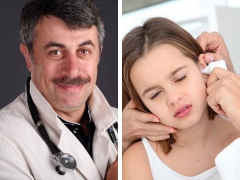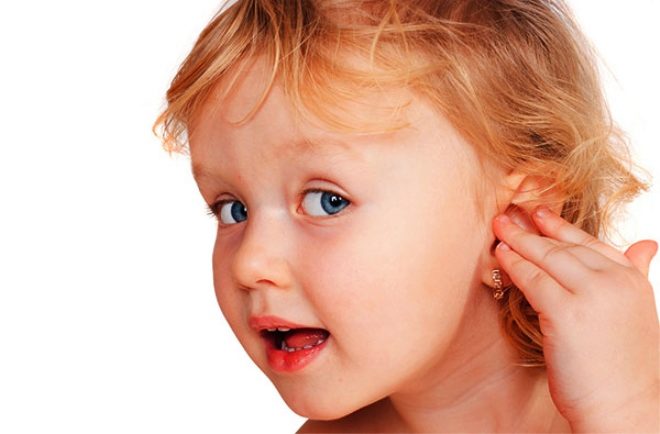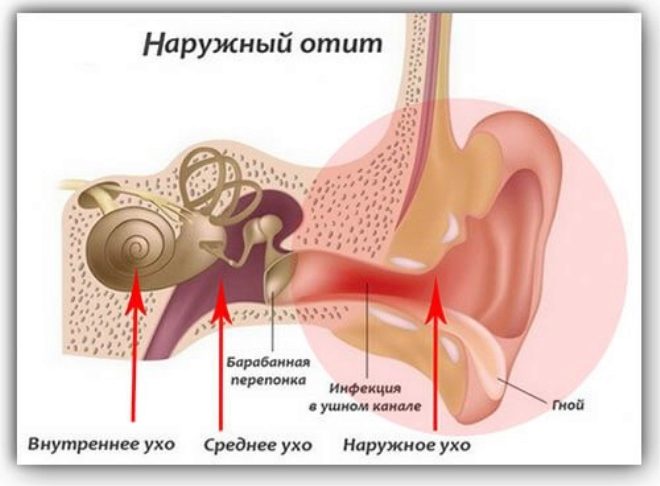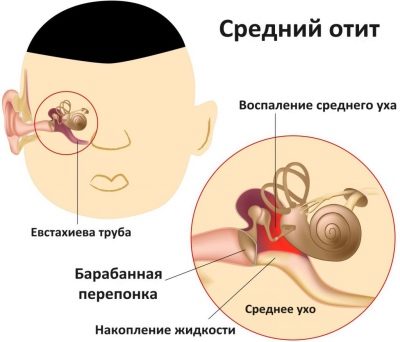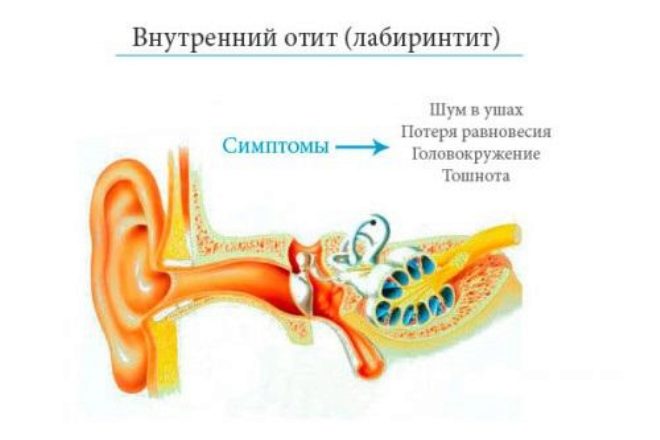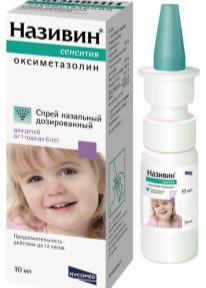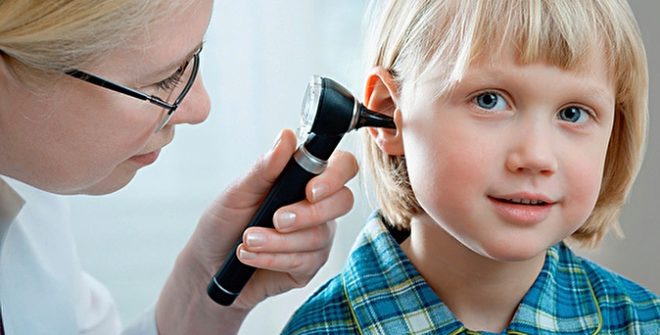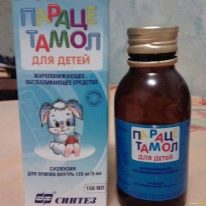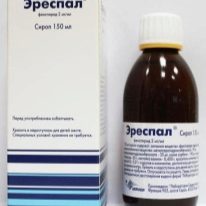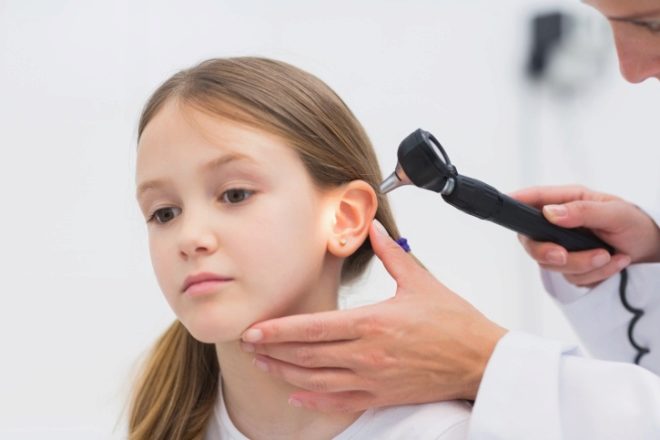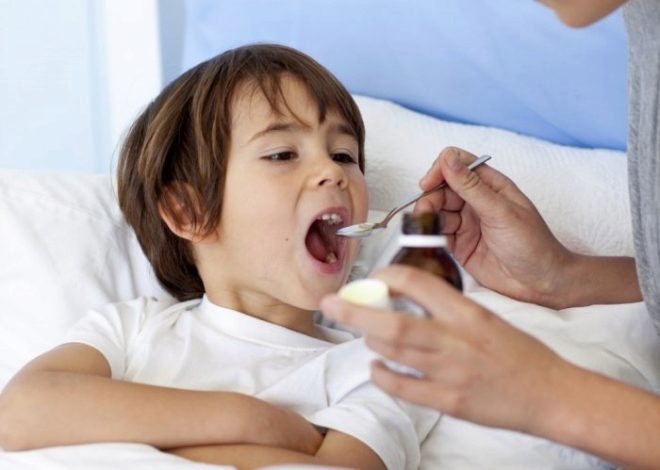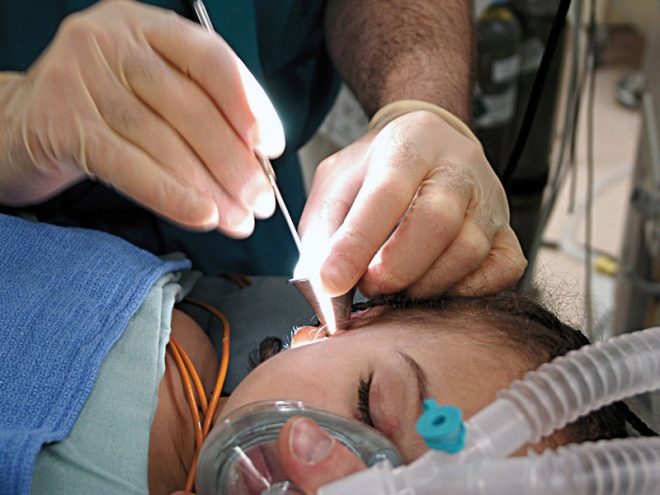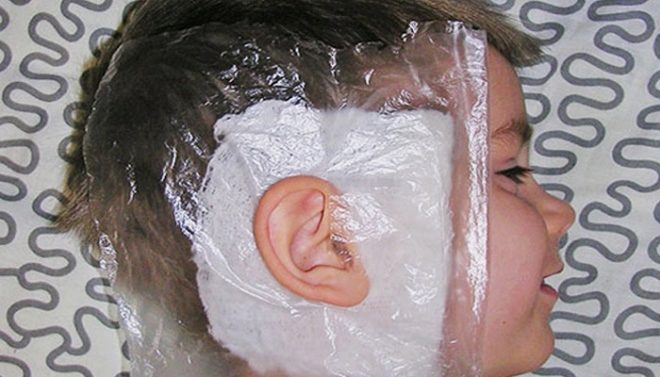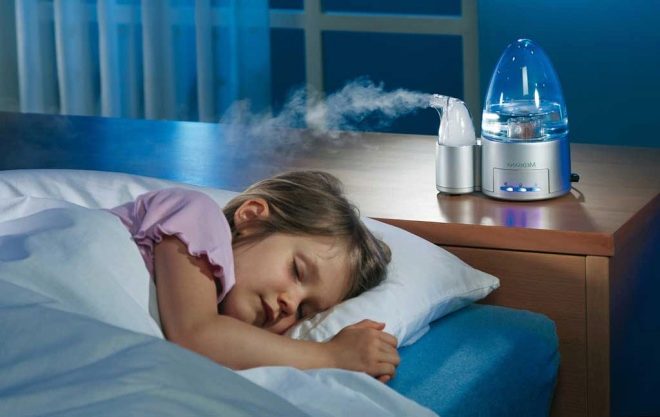Doctor Komarovsky about otitis
Children and their parents often encounter such a disease as otitis. Medical statistics say that every child has had ear infections at least once in their lives, and up to three years more than 80% of children have already had this disease. Every eighth child has otitis chronic. Evgeny Komarovsky, a well-known pediatrician, tells us why children's ears become inflamed and how to treat such a condition.
About the disease
Otitis in children can be of three types. Depending on the localization of the inflammatory process, the ailment can be external, medium or internal. The inflammatory process can be concentrated or diffuse, affecting the eardrum and other structures of the ear. The duration of the disease otitis are divided into acute and chronic. And the presence or absence of pus divides otitis into two types - catarrhal (without pus) and exudative (with pus).
Bacteria, viruses and allergens can be the cause of inflammation. They fall into the auditory tube with the wrong blowing of the nose, sneezing, sniffing, which accompany any respiratory infection.
Therefore, it is obvious that in itself, otitis media rarely happens, much more often it is a complication of viral infection. Outdoor often manifested by boils in the ear, it is a completely independent disease that is caused by microbes. Allergic otitis is a kind of reaction of the child's body to a protein-antigen, it is extremely rare to be purulent, but is accompanied by a strong swelling. If the inflammation is localized only in the auditory tube, it is called tubo-otitis.
Some children rarely get otitis, others often. This, according to Evgeny Komarovsky, depends not only on the immunity of this particular child, but also on the anatomical features of the structure of this particular ear.
In children with a short auditory tube, otitis occurs more often. With age, the tube "catches up" in length and diameter of the norm, takes a more horizontal position, and frequent otitis becomes rare or disappears altogether.
Symptoms
External otitis is difficult not to notice - the auricle reddens, sometimes visually without special medical instruments (otoscope and mirror) you can look at the furuncle or abscess, the child has a throbbing pain inherent in all abscesses. Hearing can deteriorate somewhat only at the moment when the abscess breaks through and the pus falls into the auditory tube.
Otitis media manifests itself by "shooting" in the ear, the pain increases, and then subsides for a while. There may be a slight decrease in hearing, headache, lack of appetite, dizziness, disorders of the vestibular apparatus, increased body temperature. A child who, because of his age, already knows how to speak, is quite able to tell what is bothering him. A kid who has not yet learned to speak will often touch his ear, rub it, cry.
The most difficult to diagnose at home is otitis media in infants. But there are signs that will help parents figure out what bothers the crumbs:
- During sucking, the baby’s anxiety increases.
- If you put pressure on the trestle (the protruding cartilage at the ear canal), then the pain will intensify, the baby will cry more.
- If you attach the crumb while feeding the sore ear to yourself, it will become a little easier.
If there is any suspicion of otitis in an infant, even if the ailment is not accompanied by fever or discharge of fluid from the ears, you should definitely show the baby to the doctor.
In the overwhelming majority of cases, internal otitis is also not an independent disease, but occurs in the case of improper treatment of otitis media, the advanced form of this disease, and also as a complication of meningitis.. He may manifest himself a couple of weeks after suffering a viral malady with severe sudden dizziness. Often there is noise in the diseased ear, hearing is reduced. For diagnosis, you need a doctor who will prescribe an MRI of the brain, tone audiometry.
Treatment according to Komarovsky
Yevgeny Komarovsky warns mothers and fathers that a child’s otitis cannot be treated with traditional remedies and alternative medicine, because complications of the disease can be very difficult - from acute to chronic, and then the child will be plagued by frequent otitis before the onset of deafness, paresis of the face nerve, meningitis, etc. Therefore, bury heated oil with aloe juice or walnut juice is a real parental crime.
In case of purulent otitis, it is categorically impossible to warm anything, to do warming and alcohol compresses, to bury warm oil, as caring grandmothers and traditional healers can advise. From such heat inflammatory exudative purulent process only aggravated.
Treatment of acute (sudden) otitis media in a child Yevgeny Komarovsky recommends starting treatment with instillation of vasoconstrictor nasal drops. They not only reduce the lumen of blood vessels in the nasal mucosa, but also relieve swelling in the area of the auditory tube. To do this, suitable "Nazivin", "Nazivin Sensitive" (if the child is a baby), "Nazol baby".
The main thing to remember is that for more than five days these drops do not drip, because they cause persistent drug addiction, and children’s drops should be chosen at the pharmacy, the dosage of the active substance in which is lower than in similar adult preparations.
Vasoconstrictor drops are relevant only at the very initial stage of acute otitis, when there is a chance to prevent its further development. If the chance remains unfulfilled or the attempt was unsuccessful, you should immediately contact the otolaryngologist, who will determine the type of the disease, during the inspection find out whether the eardrum is damaged. If it is intact, you can use ear drops, if it is damaged, which happens quite often, then nothing can drip into your ear.
If pus flows from the ear, then Komarovsky urges to refuse self-treatment, nothing to drip anywhere before going to the doctor.
The suppuration with a high degree of probability speaks of perforation (breakthrough) of the eardrum, through this opening the pus enters the outer ear. When perforation, it is impossible to drip in the ear, so that the medicine does not fall on the auditory nerve, the auditory ossicles and does not cause deafness.
If otitis media is accompanied by fever, it is wise to use antipyretic drugs and painkillers. To reduce the high temperature in children, it is advisable to give "Paracetamol" or "Ibuprofen". Both of these medications give a moderate anesthetic effect. Often, doctors prescribe a drug like "Erespal». It can be taken by children over two years old in the form of a syrup. In tablets, children do not give this medicine.
Do I need antibiotics?
Although most parents believe that antibiotics are definitely needed in the treatment of otitis, this is not always the case, says Yevgeny Komarovsky. With exudative otitis mediaWithout symptoms, caused by the accumulation of fluid in the cavity of the middle ear, antibiotics will in no way affect the healing process. Usually such otitis passes itself as the child recovers from the main viral disease - ARVI or flu.
Otitis media, accompanied by pain, "lumbago" in the ear, can be caused by bacteria (against which antibiotics are effective), and viruses (against which antibacterial drugs are completely ineffective).
Evgeny Komarovsky advises to wait about 2 days before embarking on active treatment. If there is no improvement for 2-3 days, this is a signal to the appointment of antibiotics to the child.
It is allowed not to wait for two days if the child’s otitis media is severe, with a high temperature, very severe pain, and if the child is under 2 years old, the doctor will most likely prescribe antibiotics immediately. For babies who have not reached the age of two, it is very important whether they have otitis media - one-sided or two-sided.
When treating otitis externa, antibiotics are rarely required, usually with antiseptic treatment. Internal otitis media requires symptomatic treatment, antibiotics for labyrinth are also prescribed extremely rarely.
In any case, the decision on the appointment of antibiotics for inflammation of the hearing organs should be made by the physician after conducting relevant studies, including bacterial culture from the ear to determine the type of pathogen. If such a culture shows the presence of certain bacteria, the doctor will prescribe the antibiotic that is most effective against specific microbes.
The method of use of antibiotics for ear inflammation, according to Yevgeny Komarovsky, is prescribed individually. If the eardrum is intact - the doctor may recommend drops with antibiotics, but antimicrobials are usually prescribed in pills, and this is quite enough. There is no need to prick medicine.
For the effectiveness of treatment, it is important that the drug accumulates in a problem sore spot, and therefore, for otitis, antibiotics are drunk for a long time and with increased doses. The minimum rate is 10 days. If the child is not two years old and if he attends kindergarten, the course is not reduced. If the child is older than 2 years and does not go to the kindergarten, the doctor may prescribe him antibiotics for only 5-7 days. Observe the timing and dosage is very important to reduce the risk of recurrent otitis media.
Otitis and deafness
In almost all types of otitis, hearing is reduced to some extent. Yevgeny Komarovsky advises to treat this as an inevitable situation. Otitis can lead to deafness or sustained hearing loss only if the inflammation has been treated improperly, the auditory ossicles or the auditory nerve are affected.
In children who have been successfully treated for otitis, reduced hearing remains for some time. He recovers on his own within 1-3 months after the end of treatment.
Surgery
Usually otitis surgery is not required. The exceptions are cases when a child with a strong and prolonged pain and suppuration in the ear cavity does not rupture the eardrum. Its strength in each child is individual, in some, already in the initial stage, otitis flows from the ear, in others, perforation does not occur. Then there is the risk of a breakthrough of purulent masses anywhere, including the brain. If there is such a threat, doctors make a small incision in the eardrum to ensure outflow of pus.
Evgeny Komarovsky reassures - the rupture of the eardrum and its incision are not dangerous for the child. It usually recovers quickly, leaving only a small scar that in no way subsequently affects the human ear.
Otitis compress
The compress should be dry, it is not necessary to wet it. For its preparation is enough cotton and a small piece of polyethylene. Cotton wool is applied to the patient's children's ear, covered with polyethylene on top and tied with a scarf or put on a hat. The ear is thus somewhat “isolated” from the surroundings, less injured, including loud sounds. In addition, cotton compress is very useful for the mother of the patient, she is so calmer.Traditional medicine no longer sees any benefits from the compress, because it does not affect the risk of developing complications or the duration of the inflammatory process.
Prevention
Moms should teach the child to blow their nose properly. Most often, they simply pinch the nose and require blowing. The child is blowing, but with the mother’s nose clamped in a handkerchief, snot they do not go where my mother wants it, but into the auditory tube, break the air exchange, accumulate and inflammation begins. Moms need to know that the auditory tube of the child is much narrower than that of an adult, and, therefore, the probability of its blockage is higher.
You can not give your child water or a mixture of a bottle in the prone position, so there is a high risk of liquid entering the auditory tube.
Otitis most often accompany children in the cold season and during periods of mass incidence of viral respiratory infections. At this time, it is better not to allow the child to be in places where a large number of people are crowded, and walks in the fresh air away from the crowds, shopping centers and closed spaces - are welcome.
Too dry air in the apartment is one of the probable causes of frequent baby otitis. Maintain the optimum temperature (18-20 degrees) and air humidity (50-70%), do wet cleaning more often, avoid situations in which your child becomes a passive smoker and has to breathe tobacco smoke. Send all smoking family members to the street, do not smoke in the car in which you carry the baby, so at times it will be possible to reduce the likelihood of such an unpleasant illness as allergic otitis.
Do all the child’s vaccination.. A common causative agent of otitis media is a hemophilus bacillus. From her now vaccinated. Another "culprit" of inflammatory processes in the ear cavity is pneumococcus. There is also a vaccine for pneumococcal infection. And if mothers and fathers do not refuse vaccination, the risk of developing severe otitis can be significantly reduced.
For more information about otitis, see the transfer of Dr. Komarovsky.
